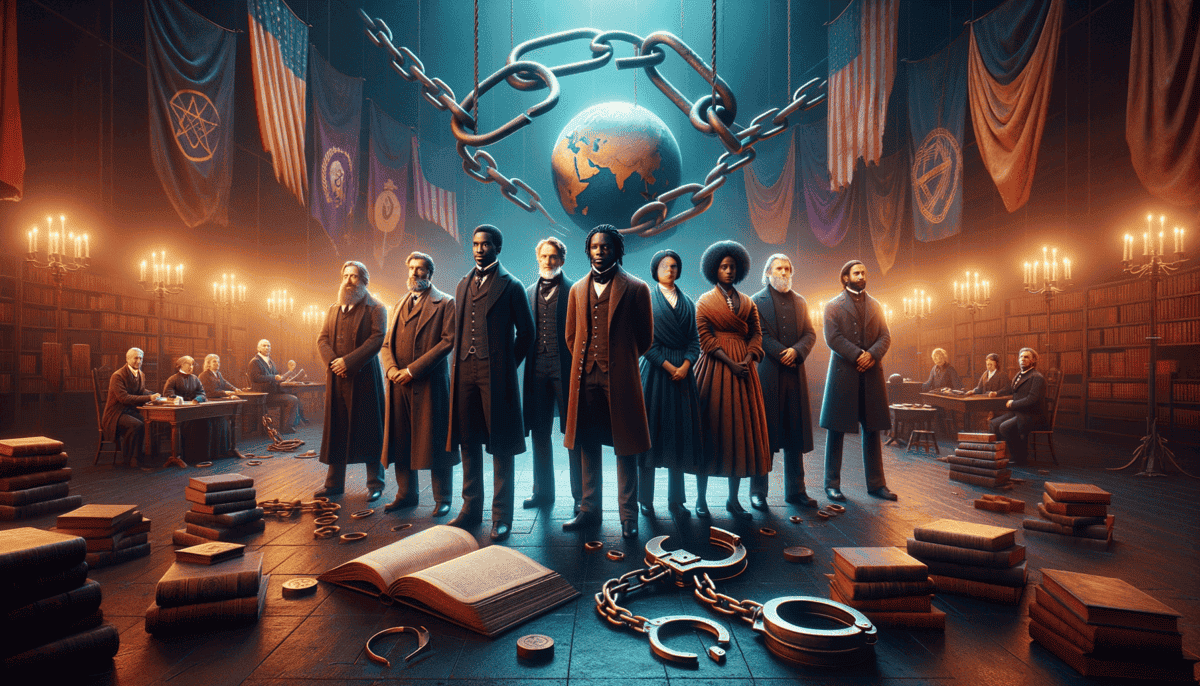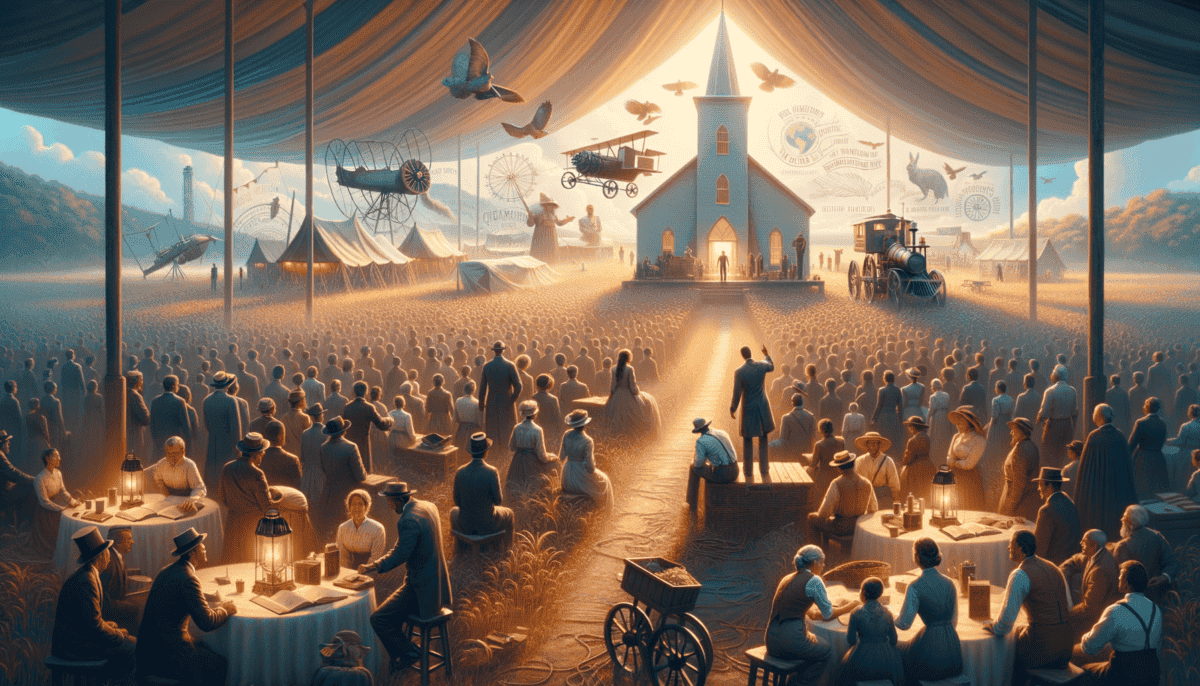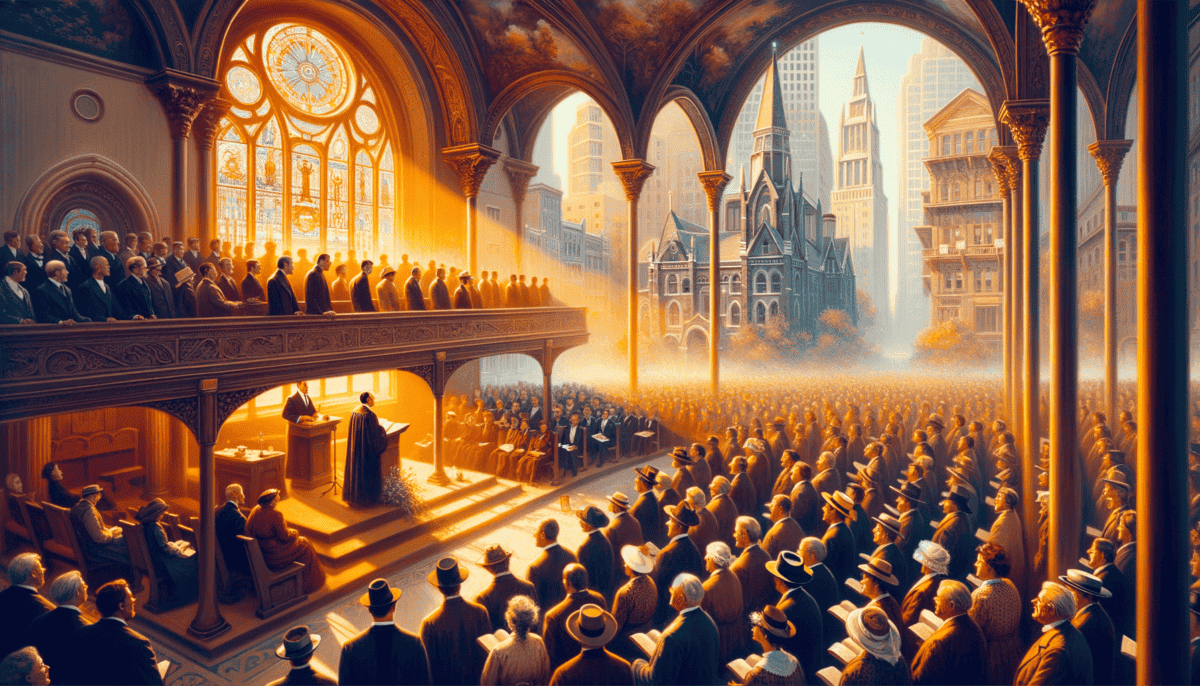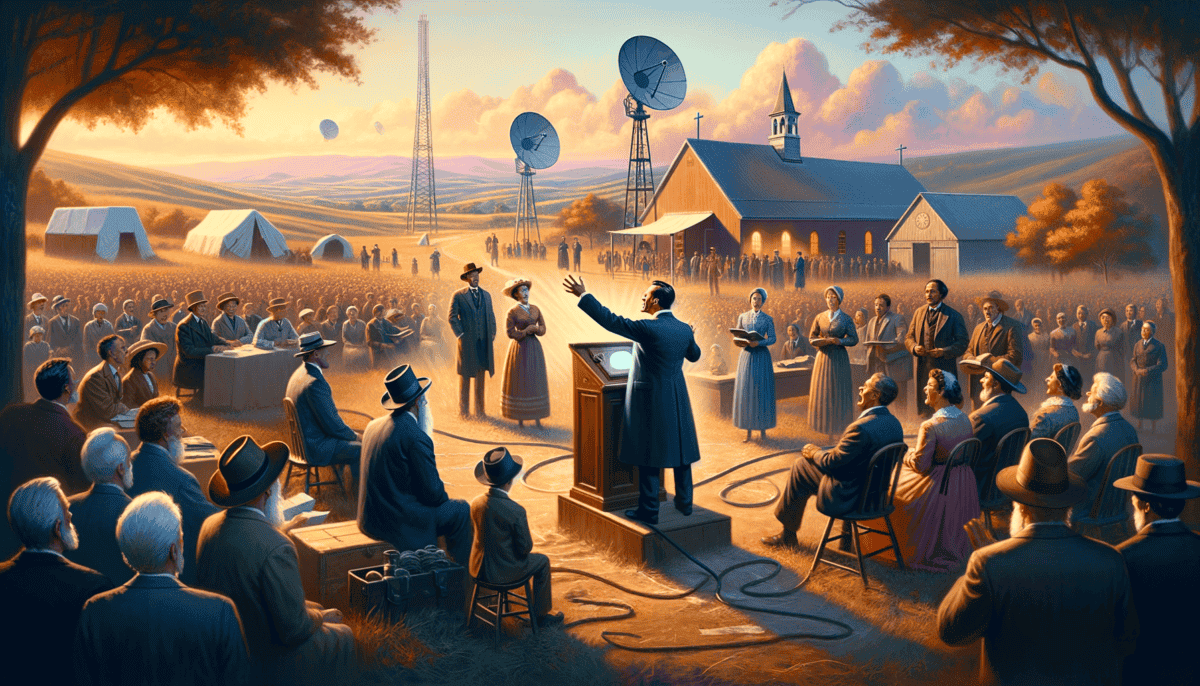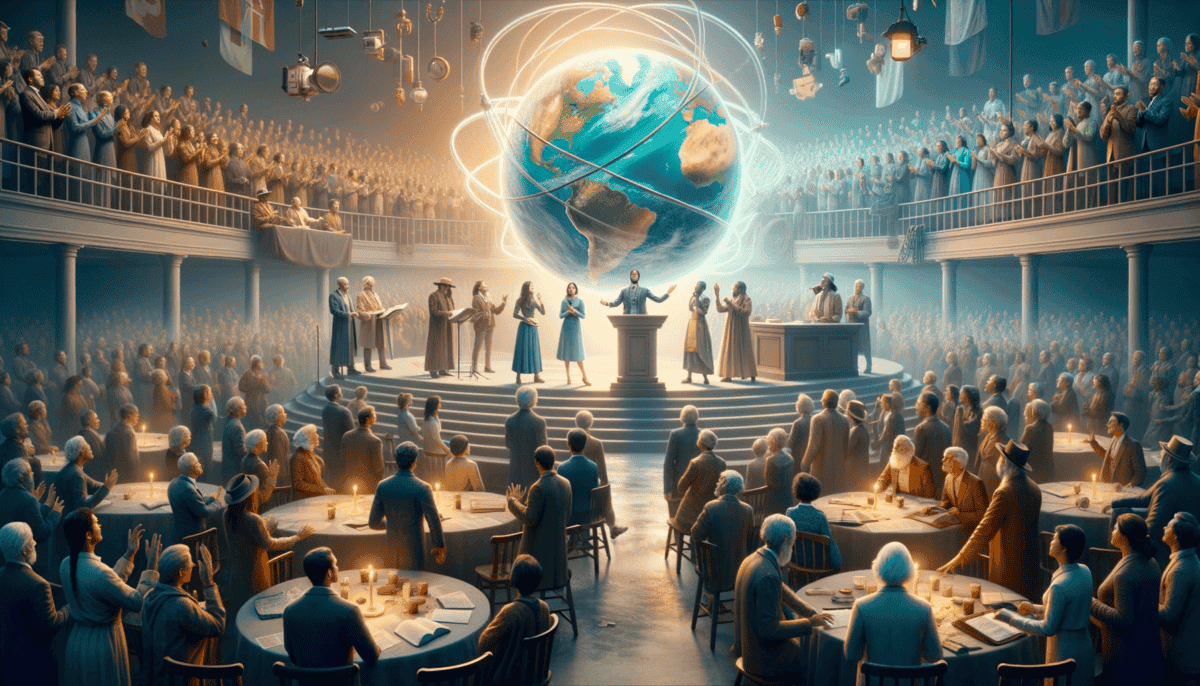A New Fire Burns
The summer breeze carried voices across the field. Hundreds of people stood in the open air. It was 1734, and something new was happening in America.
George Whitefield stepped onto a wooden box. His voice boomed over the crowd. He wasn't in a church building. He was outside where everyone could hear him.
"God loves each of you!" he called out. "You don't need fancy clothes or a special building to find Him!"
Little Sarah tugged on her mother's dress. "Why isn't he in a church, Mama?"
"Because he wants everyone to hear about God's love, dear one. Even those who can't go to church."
Miles away, in a small town called Northampton, another preacher named Jonathan Edwards was also starting something new. He spoke with quiet power about how God could change hearts.
"I saw Mrs. Miller crying during the sermon," whispered Tom to his friend Billy.
"Lots of people are feeling different lately," Billy replied. "My pa says it's like a fire spreading through people's hearts."
A Time of Change
Things were different from before:
• People didn't just go to church on Sundays
• They met in homes to pray and sing
• Everyone could learn about God, not just rich people
• Regular people could talk about their faith
Sarah's father watched as more people joined the outdoor meetings. "It's like watching a garden grow," he said. "Every day, more people come to hear about God's love."
The movement grew bigger and bigger. People called it the Great Awakening. It was changing how people thought about God and church.
Whitefield traveled from town to town on horseback. He didn't care if people were rich or poor. He spoke to everyone who would listen.
"Even the governor came to hear him speak!" Sarah told her friends excitedly.
Jonathan Edwards wrote down what was happening. He saw people changing. They were kinder to their neighbors. They helped the poor. They started schools so children could learn to read the Bible.
The summer days grew shorter, but the revival fires burned bright. More preachers joined Whitefield and Edwards. They traveled to small towns and big cities.
"Will it last?" Sarah asked her mother one evening.
Her mother smiled and pointed to the stars. "God's love is like those stars, always there. This new way of sharing it? I think it's just beginning."
As autumn leaves fell, the movement kept growing. People sang new songs. They wrote letters to friends about what they learned. They started new churches where everyone was welcome.
“Something wonderful is happening,” Whitefield wrote in his journal. “God is doing a new thing in this land.”
The sun set on another day of preaching. But this was just the start. A new kind of church was growing. It would change America forever. And soon, it would spread across the whole world.
Sarah watched the evening sky turn pink. She knew she was part of something special. Something that would touch many lives for years to come.
Hearts for Change
The year was 1787. The streets of London were busy with people. Among them walked William Wilberforce, a young man with fire in his eyes.
“Something must be done about slavery,” he said to his friend John Newton. “God’s love is for everyone.”
John nodded. He used to work on slave ships but now he knew better. He had written a song called “Amazing Grace” about how God changed his heart.
“Look at these children,” said Mary Jones, a teacher at the new Sunday school. “They work in factories all week, but now they can learn to read!”
Little Tommy, his face still smudged with factory soot, held up his book proudly. “I can spell ‘hope’ now!”
Making Things Better
Churches were doing new things to help people:
• Teaching poor children to read
• Fighting to end slavery
• Building homes for orphans
• Helping sick people get better
• Making sure workers were treated fairly
The movement that started in fields now moved to cities and towns. People wanted to show God’s love by helping others.
“Why do you help us?” asked Sally, a factory worker’s daughter.
Hannah More, who started schools for poor children, smiled. “Because Jesus loves you, and so do we.”
“We must not only pray for a better world,” Wilberforce often said. “We must work to make it better.”
In America, church people started building schools too. They wanted everyone to have a chance to learn.
“My mama never learned to read,” said Joseph, a young boy at one of the new schools. “But now I can read to her!”
Charles Finney, a preacher, traveled around talking about freedom. “God wants all people to be free,” he said. “Free from slavery, free from ignorance, free from poverty.”
Sarah Grimké and her sister Angelina spoke up too. They said women should have rights just like men. Some people didn’t like that, but they kept speaking anyway.
“Jesus treated women with respect,” Sarah said. “We should do the same.”
The churches helped in cities too. They built places where poor people could get food and shelter. They helped sick people who couldn’t pay for doctors.
“It’s like a big family,” said Mrs. Thompson, who worked at one of the shelter homes. “We take care of each other.”
William Wilberforce worked for twenty years to end slavery in England. Finally, in 1807, slave trading was made against the law.
“See what can happen when people work together?” he told his children. “We can make big changes when we don’t give up.”
The sun set on another day of hard work. But the people didn’t stop. They knew there was more to do. More people to help. More changes to make.
Tommy looked at his book one last time before bed. “When I grow up,” he said, “I want to help people too.”
The movement that started with preaching in fields now filled cities with hope. And it was still growing stronger.
Crossing Oceans
The sun rose over a ship leaving Boston harbor in 1840. On board was Sarah Miller, a young missionary with bright eyes and a brave heart.
“Are you scared?” asked Captain Jones.
“A little,” Sarah smiled. “But I want to tell people about God’s love in China.”
Back in America, churches were getting ready to send more helpers around the world. They packed:
• Bibles in different languages
• Medicine for sick people
• Books to teach reading
• Tools to build schools
• Seeds for growing food
“Look at this map,” said David Livingstone, pointing to Africa. “So many places where people need help and hope.” ️
New Friends in Far Places
Sarah’s ship finally reached China after three months. Everything looked and sounded different.
“Welcome!” said Lin Wei, a local helper. “The children are excited to meet you.”
Sarah started a small school under a big tree. She learned Chinese words while teaching English ones.
“Love speaks all languages,” Sarah wrote in her diary. “A smile means the same thing everywhere.”
In India, William Carey was teaching people to read. “Knowledge opens doors,” he said. “Everyone should have that chance.”
Mary Slessor went to Africa. She helped stop fighting between villages and saved twins who were in danger.
“We’re all God’s children,” she told the village elders. “Every life is special.”
The message of love crossed mountains, oceans, and deserts. It brought people together who looked and lived differently.
Hudson Taylor dressed like the Chinese people he lived with. “We should try to understand each other,” he said.
Some days were hard. Sometimes people got sick. Sometimes they felt lonely far from home.
“But look at our big family now,” Sarah said, watching children play together. “Chinese, American, English – all friends.”
The helpers learned new things too. They tried new foods, heard new music, and made friends they never expected.
“Teacher Sarah,” little Ming called out. “Can you tell us another story?”
Sarah gathered the children under the tree. Some had brown eyes, some blue. Some had dark skin, some light. But they all smiled the same way.
“Today’s story,” Sarah began, “is about how love makes us all family.”
Back in America and England, more people were getting ready to travel. They packed their bags with hope and their hearts with courage.
The sun set over Sarah’s little school. Tomorrow would bring new friends, new words, and new chances to share love.
“Look how far God’s love has traveled,” she whispered, watching the stars come out over China.
Faith Meets Progress
The factory whistles blew across the city in 1885. Thomas Wright walked through the smoky streets of Manchester, his Bible tucked under his arm.
“Pastor Thomas!” called Jimmy, a young factory worker. “Will you tell us about God during our lunch break today?”
Thomas smiled. “Of course! God’s love stays the same even when the world changes.”
New Questions, Old Wisdom
In his small church office, Thomas read a newspaper about something called “evolution.” Many people had questions about science and faith.
“Can we believe in both God and science?” asked Mary, a school teacher.
“God gave us minds to learn and hearts to believe,” Thomas answered. “We can do both.”
“Truth is like a beautiful diamond with many sides. Science helps us see some sides, faith helps us see others.”
The church started new programs to help workers:
• Night schools for reading
• Soup kitchens for hungry families
• Safe places for children to play
• Job training for adults
• Care for sick people
Sarah Cooper, a factory girl, learned to read in the church school. “Now I can read my Bible myself!” she said proudly.
Hearts and Machines
Thomas walked through the new train station. “Look how fast we can travel now!” he told his friend John. “We can share God’s love with more people.”
“The world is changing,” said John. “But people still need love and hope.”
Inside the big factories, workers sang hymns while the machines hummed. Their faith gave them strength.
Emma, a young mother, worked long hours. “Church is where I find peace,” she said. “It reminds me I’m more than just a worker.” ✨
Thomas started a Sunday School for factory children. They learned about God and played games away from the smoke.
“Jesus loves you,” he told them. “No matter what job you do or how much money you have.”
Building Bridges
Scientists and preachers met to talk. Some were scared of new ideas. Others saw them as gifts from God.
“God made us curious,” Thomas said. “Learning about His world is good!”
Churches used electric lights for evening services. They printed newsletters on new machines. Change wasn’t scary anymore.
“Look!” Jimmy pointed to a photograph. “Now we can show people far away what our church looks like!”
Thomas watched the sunset through factory smoke. The church bells rang clear and strong, just like always.
“God is with us in factories and laboratories,” he wrote in his journal. “In new inventions and old traditions.”
The next morning, Thomas opened his church doors early. Workers came before their shifts, finding peace before the whistles blew.
“Faith grows stronger when tested,” he told them. “Like steel in the furnace.” ⚒️
Lights, Camera, Faith
Billy Graham stepped up to the television camera in 1957. Bright lights shone all around him. Millions of people would watch him talk about God.
“Are you ready, Reverend Graham?” asked the camera man.
“Yes, Tom. Let’s help people hear about God’s love.” Billy smiled.
New Ways to Share
Sarah watched the TV with her family. “Look, Mommy! The preacher is right in our living room!”
Churches found exciting ways to reach people:
• Television shows
• Radio programs
• Records and tapes
• Christian movies
• Colorful magazines
“Now everyone can hear about Jesus, even if they can’t go to church,” said Pastor Mike Jones.
Young Hearts, New Beat
Tommy played his guitar at youth group. The music was different from old hymns. It had a rock and roll feel.
“Can we praise God with new music?” some people asked.
“God loves all kinds of music,” Tommy said. “He just wants our hearts to sing!”
“The message stays the same, but the way we share it can change with the times.”
Screen Time with God
Mary worked at a Christian radio station. She played music and took phone calls from listeners.
“Hello, WGOD radio!” she said. “How can we pray for you today?”
People called from their cars, homes, and work. The radio helped them feel close to God everywhere.
Big Crowds, Big Love
Billy Graham filled huge stadiums. Thousands came to hear him speak. TV cameras showed his message to millions more.
The whole world could hear about God’s love at the same time!
“Dear friends watching at home,” Billy said. “God loves you right where you are.” ❤️
Family Time
The Johnson family gathered around their TV for church programs. Little Jimmy loved the puppet shows about Jesus.
“Can we watch Veggie Tales again?” he asked. His mom smiled.
Churches made their own movies and cartoons. They told Bible stories with bright colors and songs.
Everyone Welcome
Pastor Lisa started a church website. “Now people can find us online!” she said.
Churches used computers to:
• Share sermons
• Send prayer requests
• Help people in need
• Connect with others
Bobby watched church on his mom’s phone when he was sick. “I still feel part of the family,” he said.
The old church building got new speakers and screens. But the message stayed the same: God loves everyone.
At night, the TV station glowed with hope. Somewhere, someone was hearing about God’s love for the first time.
Love Without Borders
Pastor Maria looked at her computer screen. Faces from all over the world smiled back. It was Sunday morning in America, evening in Asia, and afternoon in Europe. But they were all together, praying as one family.
Many Colors, One Heart
“Buenos días!” “Hello!” “Jambo!” Different voices sang together in the global church meeting. Little Mei from China waved to Sam from Texas on the screen.
“I love seeing all my friends from different places,” Mei said with a bright smile.
Helping Hands
When storms hit Haiti, churches around the world worked together. They sent food, water, and help.
“We may speak different languages, but love speaks to everyone’s heart,” said Pastor John from Kenya.
New Ways to Care
Churches today help with:
• Fighting hunger
• Building schools
• Protecting nature
• Supporting families
• Making peace
Sarah’s church started a garden to feed hungry people. “We grow love along with vegetables,” she giggled.
Open Arms
The Rainbow Community Church looked different from old churches. People wore jeans instead of fancy clothes. Some had tattoos. Others had colorful hair.
Tomorrow’s Church
Tommy used his phone to join Bible study. “Technology helps us learn about God anywhere!” he said.
Churches keep finding new ways to share God’s love:
• Virtual reality prayer rooms
• Online community groups
• Digital mission trips
• Green church buildings
Growing Together
The old church bell still rings, but now it calls to a bigger family. People from every country, culture, and background join hands in faith.
The future is bright with hope and love.
As the sun sets in New York, it rises in Tokyo. Somewhere, a child learns about God’s love for the first time. Another family finds a warm welcome. A helping hand reaches out.
Pastor Maria ends the global service with a smile. “Remember,” she says, “God’s love knows no borders. We are all one family.” ❤️
And so the story of faith grows, reaching new hearts and touching new lives, as churches continue to share hope and love with everyone, everywhere.
The little church that started long ago has grown into a worldwide family. Its doors are open wide, welcoming all who come. The message remains simple: Love God, love others. From sunrise to sunset, that love keeps spreading, bringing light to every corner of our beautiful world.


